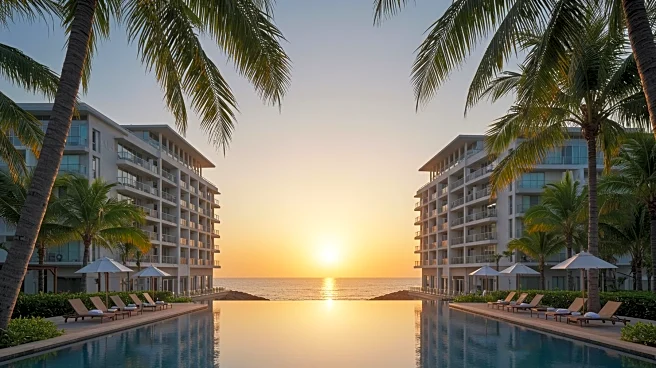What's Happening?
Hyatt Hotels Corporation has announced plans to expand its presence in Thailand by introducing The Unbound Collection by Hyatt brand through management agreements with Chai Talay Hotel Co. Ltd and Narai Hotel Company Limited. The two properties, The Barai Hua Hin and Narai Hotel, will mark the debut of this brand in Thailand. The Barai Hua Hin, scheduled to open in late 2026, will be a wellness-focused resort adjacent to the Hyatt Regency Hua Hin, featuring 90 rooms and suites, a wellness center, and multiple dining options. The Narai Hotel, set to reopen in 2028, will be located in Silom, Bangkok, offering 250 rooms and part of a larger development including dining, retail, and community spaces.
Why It's Important?
This expansion signifies Hyatt's strategic growth in the Asia-Pacific region, particularly in Thailand, where it already operates 15 properties across various brands. The introduction of The Unbound Collection by Hyatt is expected to enhance the luxury hospitality market in Thailand, catering to the increasing demand for unique and high-end travel experiences. The focus on wellness and community spaces aligns with global trends in hospitality, emphasizing holistic and immersive guest experiences. This move could potentially boost local tourism and economy by attracting international travelers seeking luxury and wellness retreats.
What's Next?
As Hyatt prepares for the opening of these new properties, the company will likely focus on marketing strategies to promote The Unbound Collection brand in Thailand. The development of these hotels may also involve collaborations with local businesses and communities to integrate cultural and regional elements into the guest experience. Stakeholders in the Thai tourism industry may anticipate increased competition and opportunities for partnerships as Hyatt expands its footprint.
Beyond the Headlines
The introduction of wellness-focused resorts like The Barai Hua Hin reflects a broader shift in the hospitality industry towards health and well-being. This trend is driven by growing consumer interest in wellness tourism, which emphasizes relaxation, rejuvenation, and holistic health practices. The Narai Hotel's integration into a mixed-use development highlights the evolving nature of urban hospitality, where hotels serve as community hubs offering diverse amenities beyond traditional lodging.











